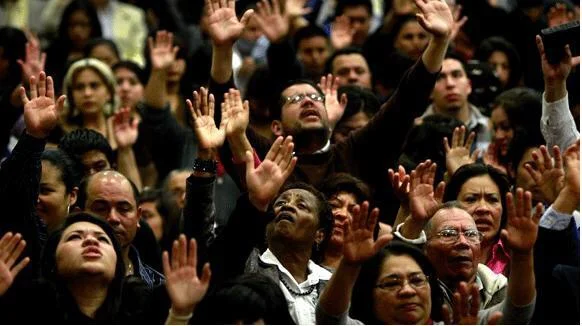Readings for the day: 2 Samuel 5:11-25, 6, and 1 Chronicles 13, 14, 15, 16
What is true worship? Is it a feeling? A style? An experience? How do we know if we’ve engaged in true worship? Is it because we leave feeling inspired? The preacher’s message warmed our hearts? We’ve eaten the bread and drunk of the cup? The music for the morning matched our musical tastes? What are the hallmarks of true worship? Authenticity? Sincerity? We’re able to identify something we get out of it?
Sadly, all of the above are true. Worship in 21st century North America has turned largely inward. It is focused, evaluated, planned, produced for the human experience. It caters to the preferences and tastes of the worshipper. It is designed primarily to make the human being feel inspired, motivated, and connected. This “inward turn” is as true for the small church as it is for the mega-church and every church in between. And it’s why we see so many Christians bounce from church to church to church over the course of their lives. Long gone are the days when one would INVEST their entire lives into one community come what may. Long gone are the days when Christians would heed the BIBLICAL command to actually practice forgiveness and reconciliation when relationships get hard. Long gone are the days when Christians would DIE TO SELF, laying aside the consumer tendencies of taste. Preference. Personal favorites. As a result, long gone are the days when the church produced robust, courageous, bold, self-sacrificing disciples of Jesus who would give their lives for the sake of the gospel and the Kingdom of God in this world. Not that it never happens, it just is more then exception rather than the rule.
So what is true worship? It is the worship God both deserves and demands. Believe it or not, God cares deeply how He is worshipped. In 1 Chronicles 13, we see what happens when God’s people - with sincere and authentic devotion in their hearts - fail to worship God in the way He commands. The people have gathered. They’re excited to bring the Ark of the Covenant into Jerusalem. They call the priests. They call the Levites. They plan a huge celebration. The whole nation is present to witness this incredible moment. They build a new cart to carry the ark in the procession. David and all of Israel are celebrating, singing, dancing before the Lord with all their might. But then an ox stumbles. Uzzah, seeking to protect the ark, puts out his hand to keep it steady. The Lord strikes him down. One can imagine the shock of the crowd. In an instant, all the music and dancing and celebration stops. Silence. Long, prolonged, awkward silence as the people come to grips with what’s just happened. David is angry. He pouts for three months, refusing to come to grips with the fact that he himself is somewhat responsible for what happened. His decision to do what was convenient (build a cart to carry the ark) rather than what God demanded (Levites carry the ark on their own shoulders) is ultimately what cost Uzzah his life. Fast forward to 1 Chronicles 15. A different picture emerges. David is ready. He is humble. He submits to God’s will. He decrees that “no one but the Levites may carry the ark of God, for the Lord had chosen them to carry the ark of the Lord and to minister to him forever.” (1 Chron. 15:2) Once again, the celebration commences. Singing. Dancing. Music. Right sacrifices. God is pleased. God accepts the worship David offers because it is singularly focused on honoring God.
What does true worship look like in our context today? Obviously, none of us know where the Ark of the Covenant resides. (Except Indiana Jones, of course!) The ceremonial laws that governed Old Testament worship have been fulfilled in Christ. Does this set us free then to worship as we choose? To do what feels good? To set the needs of the worshipper above the clear, biblical command to worship God and Him alone?
Pastors/worship leaders...is the primary thrust of your worship planning to bring honor and glory to God? To set Him high and lifted up? Or is it to meet the needs of your people? When you evaluate worship, do you measure it in terms of attendance and the emotional engagement of God’s people or the clarity of the gospel message preached through music, Word, and Sacrament?
People of God...is your primary goal in worship to get something out of it? To walk away feeling inspired, emotionally uplifted? Do you evaluate your own experience based on whether you liked the songs that were sung or felt moved by the experience? Do you evaluate the message based on its applicability to your own life?
Please hear me clearly...I am not saying these things are bad. Or should be divorced from our worship experience. I am simply saying they are SECONDARY to our primary duty in worship which is to worship God as He both deserves and demands. This, in fact, is the chief end of our existence.
